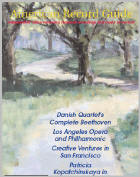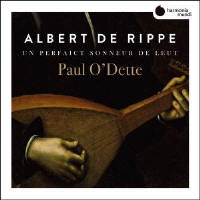Reviewer: Catherine
Moore
Albert De Rippe (c 1500-51)
“apparently refused to allow his music to be disseminated or published in
his lifetime” but his pupil Guillaume published it not long after Rippe
died. Sources for the 25 pieces included here date from 1552 to 1562. The
repertoire is very well sequenced so that almost all of the longer and more
free-form fantasias are separated by contrasting intabulations of vocal
music and dance movements. Probably born in or near Mantua, Rippe was also
known by Italianate names such as Alberto Da Ripa, Alberto Da Mantova, and
Alberto Mantovano. Entering into the service of the French king in 1518, he
was very well paid (twice as much as the other lutenists) and also, on
marriage, was given land by the King.
As lutenist Paul O’Dette explains in the booklet essay, “Whereas many of his
contemporaries [...] wrote clear transparent counterpoint, mostly in three
voices, Albert de Rippe often employed five and even six-note chords,
emulating the lush resonance of a choir.” That’s the first time I’d ever
thought of a lute sounding like a choir, and it’s given me new things to
listen for in both choral singing and lute playing—especially with respect
to resonance, blend, and melody. It is hardly a secret that Paul O’Dette’s
influence on the discovery, performance, and recording of early music is
matched only by a small number of other musicians over the past few decades.
His work as an opera conductor, festival director, teacher, and scholar both
benefits from and informs his extraordinary artistry as a lutenist. The
playing here is full of singing flow and warmth, and it is well recorded to
capture both the resonance of the instrument and the nuanced expressiveness
of the player. It all sounds effortless, but of course it’s not. From the
double-echo effects in ‘L’Eccho’ (an intabulation of ‘Dieu Qui Conduis’) to
the delicate elegance of ‘O Passi Sparsi’, Albert de Rippe could have no
better champion.
Fermer la fenêtre/Close window
|




